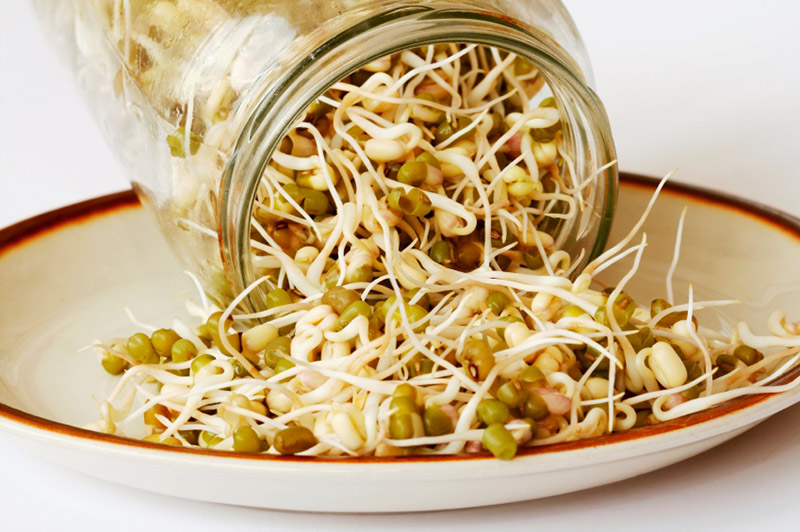 Growing your own sprouts is a cheap and easy way to improve your nutrition by eating live, raw food. A sprout is the transitional stage between a seed and a plant. Studies show that regular consumption of fruits and vegetables is associated with reduced risk of chronic diseases and increasing consumption is recommended to prevent chronic diseases related to free radical-induced oxidative stress.
Growing your own sprouts is a cheap and easy way to improve your nutrition by eating live, raw food. A sprout is the transitional stage between a seed and a plant. Studies show that regular consumption of fruits and vegetables is associated with reduced risk of chronic diseases and increasing consumption is recommended to prevent chronic diseases related to free radical-induced oxidative stress.
Nutrition and Effects of Sprouts: The seeds and sprouts of mung bean (Vigna radiata) contain abundant nutrients with biological activities, including anthocyanins (pelargonidin, delphinidin), flavonoids (isoflavones, isoliquiritigenin, rutin and quercitin), isothiocyanates, phenolic acids, tanins, organic acids, amino acids, carbohydrates, and lipids.
Dynamic changes in metabolites during the sprouting process and related biological activities, include antioxidant, antimicrobial, anti-inflammatory, anti-diabetic, anti-hypertensive, lipid metabolism accommodation, anti-hypertensive, and anti-tumour effects.
Seed Germination: A study on the effect of germination on the nutrient content of mung beans, showed significant increases in phytochemical and vitamin C content, and antioxidant activity. On day 8 the vitamin C content was 24 times higher, the phenolic compounds and total flavinoids were 4 to 7 times higher and quercetin-3-O-glucoside content increased significantly; total antioxidant activity was 6 times higher. Iron content enhanced significantly. 4 day old lentil sprouts increased in caffeic, salicylic acid and genistein; 6 day old lentil sprouts have highest tannins, flavinoids and total phenolics and highest antioxidant potential.
Antioxidant: Tartary buckwheat has higher antioxidant properties than ordinary buckwheat; both had a positive impact on liver cancer cells.
Cancer : Isoliquiritigenin, a flavonoid, is a potent anti-tumour promoting agent that inhibits the proliferation of prostate cancer cells.
Cardiovascular: Buckwheat sprouts may reduce cardiovascular risk and metabolic disorders such as hypertension due to their as rutin and quercetin content.
Cholesterol: Hepatic total cholesterol levels significantly reduced, whereas hepatic serum triglyceride levels were totally unaffected. Day 8 buckwheat sprouts (high polyphenolic and moderate quercetin) maximized hypocholesterolemic, hypotriglyceridemic, and anti-oxidative activities.
Glycaemic Index: Sprouting decreased bioavailable starch and elevated resistant starch content, altering its potential bioavailability and expected glycaemic index (GI). 3 day old sprouts have the highest total starch content, 6 day old sprouts the lowest.
Obesity: Peanut sprout extract has anti-obesity effect by lowering the expressions of a receptor which regulates the expression of adiponectin.
Growing Sprouts: All edible grains, legumes, and seeds can be sprouted. Wash the seeds thoroughly and soak overnight for about 10-12 hours in water that starts off tepid. Avoid soaking for too long as the seeds may rot and ferment. You can use a jam jar with holes in the lid or buy a purpose made jar with a mesh lid. Rinse and drain the seeds which will now be full of water; rinse every morning and evening. Once they have sprouted they should be refrigerated. Eat around day 8.
Adding Sprouts to your Diet:
- Add to salads, soups, stews and stir fry
- Serve as a side dish with Tamari sauce and sesame oil
- Serve a large handful of alfalfa on a bed of brown rice, surround with chopped tomatoes and drizzle with tahini
- Use sprouted chick peas to make hummus
- Use sprouted lentils or chick peas to make curries
We are happy to advise you on your health matters.
Lin Bridgeford DO KFRP FSCC ICAK (UK) MSc
Registered Osteopath & Kinesiologist & Yoga Teacher
Aether Bios Clinic
Saltdean Brighton
01273 309557
07710 227038
